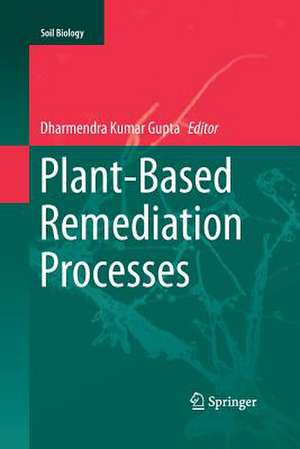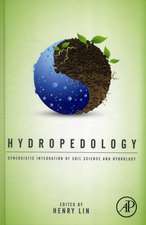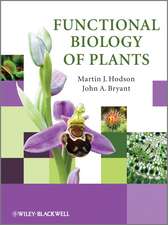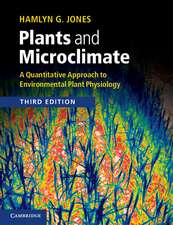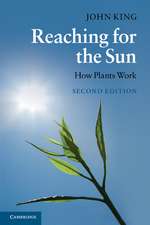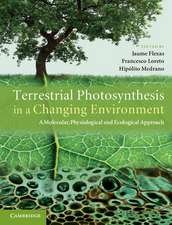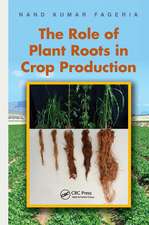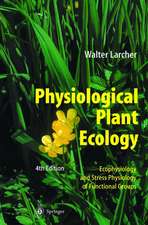Plant-Based Remediation Processes: Soil Biology, cartea 35
Editat de Dharmendra Kumar Guptaen Limba Engleză Paperback – 12 apr 2015
The main focus of this volume is on the recent advances of technologies using green plants for remediation of various metals and metalloids. Topics include biomonitoring of heavy metal pollution, amendments of higher uptake of toxic metals, transport of heavy metals in plants, and toxicity mechanisms. Further chapters discuss agro-technological methods for minimizing pollution while improving soil quality, transgenic approaches to heavy metal remediation and present protocols for metal remediation via in vitro root cultures.
| Toate formatele și edițiile | Preț | Express |
|---|---|---|
| Paperback (1) | 945.30 lei 6-8 săpt. | |
| Springer Berlin, Heidelberg – 12 apr 2015 | 945.30 lei 6-8 săpt. | |
| Hardback (1) | 949.73 lei 6-8 săpt. | |
| Springer Berlin, Heidelberg – 22 mar 2013 | 949.73 lei 6-8 săpt. |
Din seria Soil Biology
- 18%
 Preț: 958.56 lei
Preț: 958.56 lei - 18%
 Preț: 1225.62 lei
Preț: 1225.62 lei - 18%
 Preț: 957.75 lei
Preț: 957.75 lei - 18%
 Preț: 1232.09 lei
Preț: 1232.09 lei - 18%
 Preț: 949.90 lei
Preț: 949.90 lei - 18%
 Preț: 1392.95 lei
Preț: 1392.95 lei - 18%
 Preț: 952.26 lei
Preț: 952.26 lei - 18%
 Preț: 1231.32 lei
Preț: 1231.32 lei - 18%
 Preț: 956.03 lei
Preț: 956.03 lei - 18%
 Preț: 948.29 lei
Preț: 948.29 lei - 18%
 Preț: 1224.18 lei
Preț: 1224.18 lei - 18%
 Preț: 1226.90 lei
Preț: 1226.90 lei - 18%
 Preț: 952.26 lei
Preț: 952.26 lei - 18%
 Preț: 942.63 lei
Preț: 942.63 lei - 18%
 Preț: 946.55 lei
Preț: 946.55 lei - 18%
 Preț: 1221.20 lei
Preț: 1221.20 lei - 18%
 Preț: 1225.94 lei
Preț: 1225.94 lei - 18%
 Preț: 946.24 lei
Preț: 946.24 lei - 24%
 Preț: 1051.27 lei
Preț: 1051.27 lei - 18%
 Preț: 1221.02 lei
Preț: 1221.02 lei - 18%
 Preț: 947.98 lei
Preț: 947.98 lei - 18%
 Preț: 948.47 lei
Preț: 948.47 lei - 18%
 Preț: 1222.31 lei
Preț: 1222.31 lei - 18%
 Preț: 1231.64 lei
Preț: 1231.64 lei - 18%
 Preț: 1225.31 lei
Preț: 1225.31 lei - 18%
 Preț: 1229.73 lei
Preț: 1229.73 lei
Preț: 945.30 lei
Preț vechi: 1152.81 lei
-18% Nou
Puncte Express: 1418
Preț estimativ în valută:
180.89€ • 186.61$ • 150.95£
180.89€ • 186.61$ • 150.95£
Carte tipărită la comandă
Livrare economică 27 martie-10 aprilie
Preluare comenzi: 021 569.72.76
Specificații
ISBN-13: 9783642442650
ISBN-10: 364244265X
Pagini: 312
Ilustrații: XII, 299 p.
Dimensiuni: 155 x 235 x 16 mm
Greutate: 0.44 kg
Ediția:2013
Editura: Springer Berlin, Heidelberg
Colecția Springer
Seria Soil Biology
Locul publicării:Berlin, Heidelberg, Germany
ISBN-10: 364244265X
Pagini: 312
Ilustrații: XII, 299 p.
Dimensiuni: 155 x 235 x 16 mm
Greutate: 0.44 kg
Ediția:2013
Editura: Springer Berlin, Heidelberg
Colecția Springer
Seria Soil Biology
Locul publicării:Berlin, Heidelberg, Germany
Public țintă
ResearchCuprins
Phytoremediation protocols: An overview.- Protocols for applying phytotechnologies in metal contaminated soils.- Metal/metalloid phytoremediation: Ideas and future.- Remediation mechanisms of tropical plants for lead contaminated environment.- Impact of metal/metalloid contaminated areas on plant growth.- Metal remediation via in vitro root cultures.- Use of wetland plants in bioaccumulation of heavy metals.- A multi-disciplinary challenge for phytoremediation of metal-polluted pyrite waste.- Phyto-transport and assimilation of selenium.- Phytostabilization as soil remediation strategy.- Flax (Linum usitatissimum L.) and hemp (Cannabis sativa L.) as fibre crops for phytoextraction of heavy metals: Biological, agro-technological and economical point of view.- Transgenic approaches to enhance phytoremediation of heavy metal and metalloid polluted soils.- Phytoremediation towards the future: Focus on bioavailable contaminants.
Textul de pe ultima copertă
Phytoremediation is an emerging technology that employs higher plants for the clean-up of contaminated environments. Basic and applied research have unequivocally demonstrated that selected plant species possess the genetic potential to accumulate, degrade, metabolize and immobilize a wide range of contaminants.
The main focus of this volume is on the recent advances of technologies using green plants for remediation of various metals and metalloids. Topics include biomonitoring of heavy metal pollution, amendments of higher uptake of toxic metals, transport of heavy metals in plants, and toxicity mechanisms. Further chapters discuss agro-technological methods for minimizing pollution while improving soil quality, transgenic approaches to heavy metal remediation and present protocols for metal remediation via in vitro root cultures.
The main focus of this volume is on the recent advances of technologies using green plants for remediation of various metals and metalloids. Topics include biomonitoring of heavy metal pollution, amendments of higher uptake of toxic metals, transport of heavy metals in plants, and toxicity mechanisms. Further chapters discuss agro-technological methods for minimizing pollution while improving soil quality, transgenic approaches to heavy metal remediation and present protocols for metal remediation via in vitro root cultures.
Caracteristici
A valuable source of information for scientists in the field of environmental pollution and remediation Describes the latest biotechnological methods for the treatment of contaminated soils Includes case studies and protocols ? Includes supplementary material: sn.pub/extras
